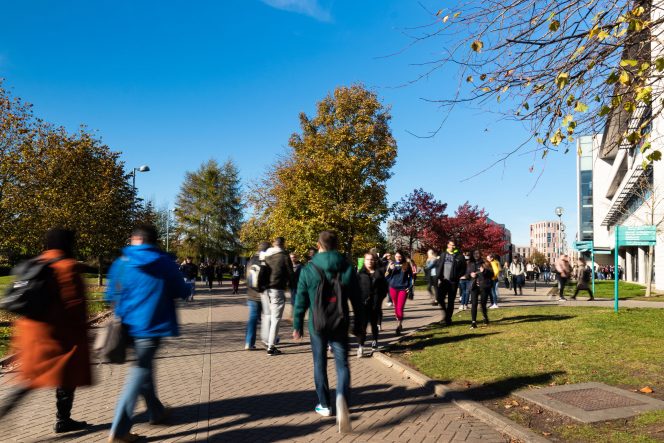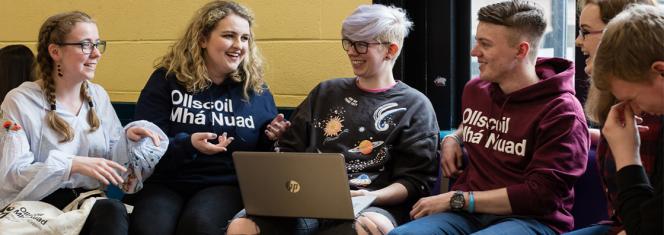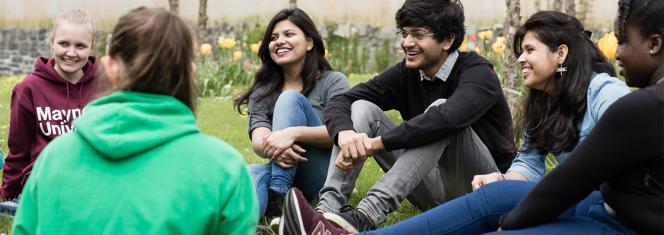Transferring from first year Arts/BCL into second year LLB/BCL
Transferring into the LLB
Arts (MH101) (15 or 30 ECTS of Law), BCL (Law and Accounting), BCL (Law and Arts), BCL (Law and Business) or BCL (Law and Criminology) students have the option of transferring into year two of the LLB programme, if they successfully complete first year.
Students must pass their law modules and obtain at least 400 overall in first year Law (this means maintaining an average of 40 across all first year Law modules) and pass all other first year subjects in order to be eligible to transfer into year two of the LLB programme.
The LLB is four years in total, as opposed to the BCL programmes, which are three year programmes.
Transferring into the BCL
Arts (MH101) students who complete 30 ECTS of Law in first year also have the option of transferring into year two of the BCL (Law and Accounting)*, BCL (Law and Arts), BCL (Law and Business)** or BCL (Law and Criminology) programmes***, if they successfully complete first year.
These students must pass their law modules and obtain at least 400 overall in first year Law (this means maintaining an average of 40 across the three first year Law modules) and pass all other first year subjects.
*If students wish to transfer into year two of the BCL (Law and Accounting), students must take 30 ECTS of Law, 15 ECTS of Accounting in Semester 1, and must pick up an extra 7.5 ECTS of Accounting in Semester 2. Students considering this route are strongly encouraged to take 15 ECTS of Economics in Semester 1 (in addition to 30 ECTS of Law and 15 ECTS of Accounting).
**If students wish to transfer into year two of BCL (Law and Business), students must take 30 ECTS of Law and 30 ECTS of Business (either stream of Business) in first year.
***If students wish to transfer into year two of BCL (Law and Criminology), students must take 30 ECTS of Law and 15 ECTS of Criminology in first year.
Students must also meet any additional requirements set out by the Department of Economics, Finance and Accounting or by the School of Business, respectively. Students should contact the Department of Economics, Finance and Accounting or Business School offices to enquire as to any such requirements.
Arts (MH101) students who complete 15 ECTS of Law in first year may transfer into the BCL (Law and Arts). Such students must major in Law in order to graduate with a BCL (i.e. an accredited Law degree). If students do not major in Law, they will instead undertake a BA Double Major which is not an accredited Law degree.
The Transfer Application Process
Students can decide to transfer during registration for year 2 in September.
NOTE: there is no cap on the number of students permitted to transfer each year. Once a student meets the required grade point (400) and passes his/her other two first year subjects, he/she is automatically entitled to progress into the second year of one of our programmes.
If you do not achieve 400
Students who fall below the 400 threshold, will have the opportunity to improve their marks in the Autumn sitting of examinations.
Both the LLB and BCL (but not the BA) are ‘approved’ law degrees for the purpose of eligibility to take the King’s Inns’ examination for entry to the Barrister-at-Law degree at the King’s Inns (required training if you want to become a barrister).
Students on the BCL and LLB must complete the following subjects to be eligible to take the King's Inns Barrister-at-Law entrance exams directly following graduation:
Equity & Trusts
Jurisprudence
Irish Land Law* (including the Law of Succession)
Administrative Law
Company Law
Law of the European Union.
Land Law / Property Law
*For the purpose of accreditation, a pass by compensation in any of these modules will be treated as a pass by the King's Inns'. *
On the LLB, except for Jurisprudence, all the modules above are compulsory already. Therefore, an LLB student must select LW354 Jurisprudence I in year 3 to meet King's Inns requirements. It is not necessary to select LW358 Jurisprudence II.
On the BCL, except for Administrative Law and Jurisprudence, all the modules above are compulsory already. Therefore, a BCL student must select LW295 Administrative Law in Ireland in year 2 and LW354 Jurisprudence I in year 3 to meet King's Inns requirements.
*It is not necessary to select LW358 Jurisprudence II. Please note also that it is not possible to take Jurisprudence II without first completing Jurisprudence I.*
Although it is not necessary in order to have an approved law degree, if you wish to take the bar entrance examinations after your degree, we recommend that you take Evidence Law as an option in year 3. This is one of the entrance examinations for the King’s Inns. The other entrance exams – Constitutional Law, Contract Law, Criminal Law and Torts – are all compulsory on the LLB and BCL though if you are on the BCL, we also recommend that you take the LW223 Law of Obligations optional module in year 2 as Contract I and Torts I only cover half the relevant King’s Inns syllabi.
For more information on becoming a barrister, check out www.kingsinns.ie
Undergraduate Students
Studying abroad as part of your Law degree at Maynooth offers a fantastic opportunity to live in a different country, expand your cultural, social and linguistic horizons, and experience different approaches and methods of university education. Students on any of our undergraduate programmes can take their penultimate year to study in Europe as an Erasmus student (for which Erasmus grants are available), or outside of Europe as an international student. For example, some of our students have studied law at Boston College Law School, alongside graduate students. David Fitzmaurice and Sharon Hickey both studied at Boston and have each gone on to complete LLMs in top US universities since graduating from Maynooth University School of Law and Criminology.
The partner universities which currently offer modules in Law are listed below. The majority of these universities offer modules in English. For a full list of the University's general Erasmus partners and also Non-EU partners (ie across all disciplines, not just Law), see the International Office's website. If you have an interest in a particular partner university that is not currently listed as offering Law modules, it may still be possible to check what is available in terms of Law.
For BCL students, the year abroad is an additional year, turning the degree from three years into four years, with the third year spent abroad. Law & Arts or Law & Business students are encouraged to take some law modules as part of their study abroad, but this is not compulsory.
For LLB students, the year abroad is an integrated year of the degree, meaning that the year abroad comes instead of (rather than additional to) one of the years of study in Maynooth. For this reason, LLB students abroad are required to obtain the equivalent credit in Law that they would have obtained in Maynooth. The year abroad is undertaken in the third year of the four year degree. Note that some of the partner universities listed below may not have sufficient Law modules available through English to host students for the LLB integrated year abroad.
Our Departmental Study Abroad co-ordinator is Dr John Reynolds
| University |
Country |
Language |
| University of Notre Dame (Fremantle/Sydney) |
Australia |
English |
| Université de Strasbourg |
France |
French |
| Catholic University of Lyon |
France |
English, French |
| Toulouse 1 Capitole University |
France |
French |
| European University Viadrina Frankfurt |
Germany |
English, German |
| University of Insubria |
Italy |
English, Italian |
| University of Trento |
Italy |
English, Italian |
| University of Groningen |
Netherlands |
English, Dutch |
| Comenius University Bratislava |
Slovakia |
English |
| University of Ljubljana |
Slovenia |
English |
| Boston College |
United States of America |
English |
Postgraduate Students
At postgraduate level, students undertaking the LLM (International Business Law) have the option of spending a semester in Lyon.
Each year, Maynooth University School of Law and Criminology arranges special work placement schemes for undergraduate and postgraduate students with leading law firms, NGOs, and other organisations.
Undergraduate Students
The Department of Law’s Work Placement Scheme for undergraduate students provides them the opportunity to experience working in a top commercial legal practice. These opportunities allow students to build their skill sets, their confidence, and their effectiveness as team members. A successful placement not only earns our graduates credibility with a particular employer, it shows performance in a workplace environment that other graduates can only promise.
Students on all of our undergraduate programmes are eligible to apply for placement opportunities. Both BCL and LLB students apply to the Department of Law in their second year of study. The application process is competitive and the best candidates are put forward for interview to the relevant firm(s).
For BCL students, the Work Placement year is an additional year between Years 2 and 3. For LLB students, the Work Placement year also takes place during Year 3, but students are required to complete Year 3 modules in their final, fourth year, in lieu of the optional modules ordinarily offered to Year 4 LLB students. Students graduate with either a BCL (with Work Placement) or an LLB (Clinical) degree.
Previous placement partners have included Matheson, A&L Goodbody, McDowell Purcell, McCann Fitzgerald, William Fry, Mason, Hayes & Curran, and The Medical Council.
Congratulations to the following students, who have been selected to spend the a year of their legal studies on work placement in top law firms:
Postgraduate Students
The Department of Law also offers placement opportunities at postgraduate level.
Advocacy Placements
Students have the chance to apply, on a competitive basis, for an Advocacy placement. This year, placements will be offered, through the Advocacy module, at:
LLM Placements
Placements are also offered to postgraduate students through other LLM modules, such as the Public Procurement Law module.
Summer Placement Opportunities
Additionally, the Department sends two final-year students on the summer-long Superior Courts Internship Programme each year.
There are many resources available through the Library, both in print and electronic format. To help you get the most from the library service there are a number of Library Information Skills Tutorials (LIST). Sessions last no more than 30 minutes. To attend, meet in the Library five minutes before the start of the session.
LIST Timetable for Semester II 2018
Help offered by the Library will ensure that you can:
- identify appropriate information
- access print and electronic resources
- avoid plagiarism by citing and referencing material correctly
- make the best use of the Library
For further information, see the Library website.
Research Tools
The legal research platform offered by Justis, JustCite, is available to Department of Law students and is very useful for research and study purposes. Students must access the platform either on campus or via off campus login through the Library website.
The Centre for Teaching and Learning (CTL) through its Academic Advisory Office and Academic Writing Centre endeavours to help students identify and achieve their academic goals, to promote intellectual discovery, and to help students become independent and self-directed learners. CTL seeks to provide an open, welcoming, and inclusive environment that nurtures and empowers all students through its workshops, services, and initiatives.
Other University Resources
For a comprehensive list of the supports offered by the University, see either Moodle or Student Services.
APPLICATIONS FOR SPUR 2024 ARE NOW OPEN
A SPUR internship offers the opportunity to engage in a six week departmental research project, gain an insight into the world of research and postgraduate study and enhance your personal & professional development.
You can find full details here:
SPUR 2024 Guidelines and Application Process
SPUR Project descriptors are live HERE.




